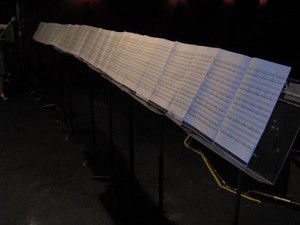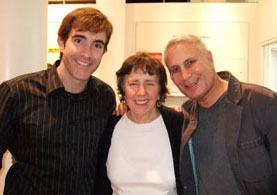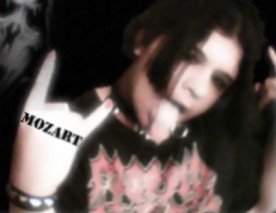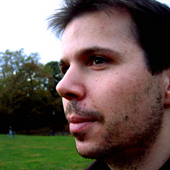 Tomorrow night is the world premiere of Steven Stucky’s August 4, 1964 with the Dallas Symphony Orchestra, Chorus and soloists.
Tomorrow night is the world premiere of Steven Stucky’s August 4, 1964 with the Dallas Symphony Orchestra, Chorus and soloists.
I spoke with Stucky last summer in Ithaca, NY about the work. Listen to the interview here. (about 4 minutes)
I’ll have more coverage of the premiere tomorrow night and reactions on Friday.
Read more (including the NY Times piece from Sunday and the program notes here.)
 This is the score for “Piece in the Shape of a Square” spread out across the stage at the Players Theatre. Tonight in Manhattan at 8:00 PM we’re celebrating the 50th anniversary of the birth of Minimalism with a concert of Steve Reich’s “Piano Phase,” two “Piano Pieces” by the obscure but great Terry Jennings, Terry Riley’s “In C,” and this piece by Philip Glass.
This is the score for “Piece in the Shape of a Square” spread out across the stage at the Players Theatre. Tonight in Manhattan at 8:00 PM we’re celebrating the 50th anniversary of the birth of Minimalism with a concert of Steve Reich’s “Piano Phase,” two “Piano Pieces” by the obscure but great Terry Jennings, Terry Riley’s “In C,” and this piece by Philip Glass.
The Players Theatre, 115 MacDougal Street, Greenwich VIllage, Manhattan. Tickets are $20 ($15 with Student ID). Be there or be a person in the shape of a square.
 1938 was the beginning of a very rough patch for Europe but–as it turns out–it was a great year for the future of American music. Several of America’s most influential living composers were born in the early dawn of World War II, including John Corigliano, Joan Tower, Frederic Rzewski, Charles Wuorinen, William Bolcom, and John Harbison. The serendipity of that bountiful year has not gone unnoticed as a couple of new recordings and numerous 70th birthday bashes will attest.
1938 was the beginning of a very rough patch for Europe but–as it turns out–it was a great year for the future of American music. Several of America’s most influential living composers were born in the early dawn of World War II, including John Corigliano, Joan Tower, Frederic Rzewski, Charles Wuorinen, William Bolcom, and John Harbison. The serendipity of that bountiful year has not gone unnoticed as a couple of new recordings and numerous 70th birthday bashes will attest.
The most satisfying of these celebrations of the Class of ’38 to cross our path is pianist Blair McMillen’s revelatory Centaur release multiplicities: ’38: Music by Composers born in 1938. Multiplicities is exactly the right word in this case, because the composers represented here may have been born in the same year but, stylistically, they come from different planets. The cool and polite elegance of Corigliano and the cosmopolitan eclecticism of Bolson are as far removed from the populist Americana of Tower and Rzewski as they are from the gnarly serialism of Wuorinen.
And, of course, there is John Harbison, the pick of the 1938 litter IMHO (as the kids like to say), who has spectacularly succeeded at his own stated aesthetic intent: “…to make each piece different from the others, to find clear, fresh large designs, to reinvent tradition.”
Blair McMillen is one of three or four great young pianists who specialize in new music and if you throw in the caveat “has an uncanny feeling for the composer’s intent,” he may well stand alone. The quality of his playing on multiplicities: ’38 is consistently extraordinary but just as remarkable is the way he perfectly captures the individual “voice” of each of these highly diverse composers. We are accustomed to hearing most of them in larger settings but here, stripped down to a single piano (or in the case Corigliano’s Chiraoscuro two pianos tuned ¼ tone apart), the dazzling range of the Class of ‘38’s compositional talents becomes manifest. For his uncanny ability to contrast and compare music of enormous diversity, we owe McMillen a debt.
And don’t forget Monday night at Merkin Hall when the Da Capo Chamber Players, for whom McMillen is pianist, presents a 70th birthday portrait of Joan Tower. Tower was an original founder of Da Capo and its pianist for 15 years.
This is just a friendly reminder about our upcoming concert next Wednesday, September 17th. Sequenza21 and Music On MacDougal are teaming up to present a concert of early Minimalism in celebration of the 50th anniversary of the genre.
M50: Minimalism Turns Fifty
When: September 17th, 2008 at 8:00 PM
Where: The Players Theatre, in Greenwich Village, Manhattan
115 MacDougal Street, New York, NY 10012
Tickets: $20 (Student tickets $15 with Student ID) By Phone: 212-352-3101 or Online.
Program:
Steve Reich — “Piano Phase” (1967) (Version for two Marimbas)
Philip Glass — “Piece in the Shape of a Square” (1967)
Terry Jennings — “Piano Piece” (December 1958) and “Piano Piece” (June 1960)
Intermission
Terry Riley — “In C” (1964)
The concert is made possible in part by the support of Cold Blue Music, and by Bechstein, the official piano sponsor of Music On MacDougal.
See you there! Tell your friends! It’s going to be great, and you won’t want to miss it.
The BBC Proms is ongoing until the end of this week, the traditional Last Night at the Proms being on Saturday night. For me it all ended about a week and a half ago, but there are a number of things still to report on.
The Proms on August 19, given by the BBC Scottish Symphony Orchestra, conducted by Ilan Volkov, which was a collaboration between the BBC and IRCAM, featured the music of Jonathan Harvey, a long time associate of IRCAM. It included the first performance of Speakings, a major work of Harvey’s which had been commissioned by the BBC, IRCAM, and Radio France and which was also the final product of a three-year association between Harvey and the orchestra. The concert was in three parts, divided by two intermissions, each one of which consisted of a relatively brief piece for tape or electronics, followed by a larger scale instrumental work. The first contained Harvey’s Tombeau de Messiaen for piano and digital audio tape, followed by Messiaen’s Concert á quatre, the second Harvey’s Mortuos plango, vivos voco for eight channel tape, followed by Speakings for orchestra and live electronics, and the third Varèse’s Poème électronique for magnetic tape and Déserts for fifteen wind instrument, percussion and magnetic tape.
(more…)
John Adams – On the Transmigration of Souls
Michael Gordon – The Sad Park
Dennis Báthory-Kitsz: The Key of Locust
Phil Kline – Vigil
Elodie Lauten: S.O.S.W.T.C
 There’s been a certain amount of breathless reportage about a new study linking personality and musical taste done by Adrian North at the Heriot-Watt University in Edinburgh, UK. It’s hard to be sure where things went awry, but by the time the media got a hold of the results they were badly exaggerated.
There’s been a certain amount of breathless reportage about a new study linking personality and musical taste done by Adrian North at the Heriot-Watt University in Edinburgh, UK. It’s hard to be sure where things went awry, but by the time the media got a hold of the results they were badly exaggerated.
The BBC, for instance, says the research “suggested classical music fans were shy, while heavy metal aficionados were gentle and at ease with themselves.” North himself, interviewed by the BBC, makes similarly bold claims: “If you know a person’s music preference you can tell what kind of person they are, who to sell to. There are obvious implications for the music industry who are worried about declining CD sales. One of the most surprising things is the similarities between fans of classical music and heavy metal. They’re both creative and at ease but not outgoing.” These statements imply a very strong effect—the sort of effect that should mean that if you know somebody’s musical taste you can make fairly accurate predictions about his or her personality.
If you’re starting to be skeptical, you’re not alone. Jonathan Bellman, at Dial M, has a pretty good rant you might want to read.
Knowing that the media is notoriously bad at accurately reporting scientific findings, I wanted to know what we’re really talking about here, so I e-mailed Professor North with a few questions.
 How does it sound – a double concerto written by a musician weaned on Beethoven, salsa, Stravinsky and Bulgarian folk music? In short – like nothing else!
How does it sound – a double concerto written by a musician weaned on Beethoven, salsa, Stravinsky and Bulgarian folk music? In short – like nothing else!
The Danish composer Anders Koppel (b. 1947) is himself. “My music consists of the life I have lived,” is as close as he gets to a definition of his style.
Anders Koppel grew up with music all day long. His father, Herman D. Koppel, was one of Denmark’s leading composers and pianists, and worked in the living room at home. Anders and his siblings were eye-witnesses to all aspects of the musical creative process and got to know about the smallest components of music. As adults all four became some of the most prominent Danish musicians.
The key words for Anders’ music are energy, collectivity and festivity. After one of the most versatile careers in Danish music, which still includes intense improvisations on Hammond organ, Anders Koppel is now concentrating on writing classical solo concertos. He has written over 20 since the mid-1990s, most recently also a couple of double concertos.
On two CDs from Dacapo you can hear Anders’ mixture of vital energy and classical forms. On one CD his son Benjamin is the soloist in his Saxophone Concertos 1 and 2, and on the other you can hear Anders Koppel’s double concertos: one is for violin and accordion with a definite touch of tango. The other is for saxophone and piano and drags Beethoven along to a nightclub. There are inserted improvisations that give the music freedom and personality – a good indication of the attitude of this congenial composer, who was one of Denmark’s best known hippies in the 1960s and is still a passionate representative of breadth of taste and a zest for life.
 He’s been on my list for a while now, to make famous (ha ha) as an S21 “click pick”. But before I get the chance to feature him, Huck Hodge goes and wins this year’s Gaudeamus Prize:
He’s been on my list for a while now, to make famous (ha ha) as an S21 “click pick”. But before I get the chance to feature him, Huck Hodge goes and wins this year’s Gaudeamus Prize:
At the final concert of the International Gaudeamus Music Week 2008, which took place in Amsterdam from 1 to 7 September, the Gaudeamus Prize was awarded to the American composer Huck Hodge (1977).
The Gaudeamus Prize, an award of 4,550 Euros, is intended as a commission for a new work to be performed at the next edition of the International Gaudeamus Music Week. Hodge received the prize for Parallaxes, a composition for ensemble, performed on September 3 at the “Muziekgebouw aan ’t Y” by the Asko|Schönberg Ensemble conducted by Bas Wiegers.
His site will fill you in on his work, with plenty of good listening. From his C.V. it looks like he’s taking a post up in my old hometown of Seattle, teaching composition at the University of Washington. Bully for them, and bravo to Huck.